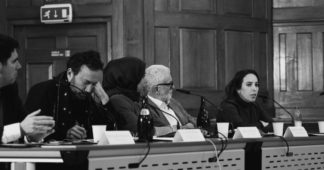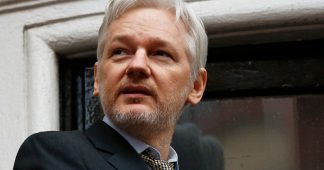The judge set to rule on the Assange extradition case was previously paid to represent the interests of MI6 and the Ministry of Defence – whose activities WikiLeaks has exposed.
By MARK CURTIS and JOHN McEVOY
19 February 2024
One of the two High Court judges who will rule on Julian Assange’s bid to stop his extradition to the US represented the UK’s Secret Intelligence Service (MI6) and the Ministry of Defence, Declassified has found.
Justice Jeremy Johnson has also been a specially vetted barrister, cleared by the UK authorities to access top secret information.
Johnson will sit with Dame Victoria Sharp, his senior judge, to decide the fate of the WikiLeaks co-founder. If extradited, Assange faces a maximum sentence of 175 years.
His persecution by the US authorities has been at the behest of Washington’s intelligence and security services, with whom the UK has deep relations.
Assange’s journalistic career has been marked by exposing the dirty secrets of the US and UK national security establishments. He now faces a judge who has acted for, and received security clearance from, some of those same state agencies.
As with previous judges who have ruled on Assange’s case, this raises concerns about institutional conflicts of interest.
Exactly how much Johnson has been paid for his work for government departments is not clear. Records show he was paid twice by the Government Legal Department for his services in 2018. The sum was over £55,000.
Briefed by MI6
Justice Johnson became a deputy High Court judge in 2016 and a full judge in 2019. His biography states he has been “often acting in cases involving the police and government departments”.
As a barrister, in 2007 he represented MI6 as an observer during the inquests into the deaths of Princess Diana and Dodi Al Fayed.
Johnson worked alongside Robin Tam QC, previously described by legal directories as a barrister who “does an enormous amount of often sensitive work” for the UK government.
At the time, Foreign Office sources could not recall “a previous occasion when MI6 [had] appointed lawyers to an inquest”.
MI6 was reportedly “so concerned by possible revelations” during the inquest that Johnson was appointed to “sit in on the hearing”.
He reportedly received a brief from MI6 in advance of the inquest, and was tasked with providing “such assistance as the coroner may require”.
Defending the ministry
Johnson has also represented the UK Ministry of Defence (MoD) on at least two occasions.
In 2013, he acted for the department during the high-profile Al-Sweady inquiry, which looked into allegations that “British soldiers torture and unlawfully killed Iraqi prisoners” in 2004.
The MoD’s lawyers said the Iraqi allegations were a “product of lies” and that those making the claims “were guilty of a criminal conspiracy”.
Johnson argued there was “compelling and extensive and independent forensic evidence” to refute the case. The five-year inquiry, which cost around £25m, exonerated the British troops.
Johnson also acted for the MoD in 2011, in an appeal case against Shaun Wood, a Royal Air Force (RAF) serviceman.
Wood had the previous year won his case claiming compensation against the MoD, arguing his neurological condition akin to Parkinson’s disease was caused by exposure to organic solvents while serving in the RAF.
The judge upheld Wood’s claim against the MoD, which had admitted a breach of duty but disputed that this had caused the damage claimed by him.
‘Highest security clearance’
Johnson was appointed by the Attorney General to be a “special advocate” in around 2007, Declassified understands. These are specially vetted barristers who act for the purpose of hearing secret evidence in a closed court.
Special advocates “must undergo and obtain Developed Vetting (the highest level of HM Government security clearance) prior to their appointment”, government guidance states.
Developed Vetting is required for individuals having “frequent and uncontrolled access to TOP SECRET assets or require any access to TOP SECRET codeword material”.
In 2016, Johnson acted as a special advocate in the case of Abdel Hakim Belhaj, a Libyan national who accused the UK government and MI6 of participating in kidnapping him and his pregnant wife, Fatima Bouchar.
The UK government later apologised for its actions that contributed to Belhaj and Bouchar’s rendition, detention and torture.
WikiLeaks has published sensitive documents on the US and Britain’s use of “extraordinary rendition” during the war on terror.
In 2013, Johnson was among 57 special advocates who criticised the Justice and Security Act, which provided that UK “courts can… hear evidence withheld from one party – and their lawyers – on national security grounds”.
The lawyers called the reform “fundamentally unfair” and “a departure from the foundational principle of natural justice that all parties are entitled to see and challenge”.
Sharp and Johnson
The lead judge in Assange’s extradition case at the High Court is Dame Victoria Sharp, the president of the King’s Bench Division who was appointed in 2019 by then prime minister Theresa May.
Declassified has shown that Sharp has family links to the Conservative Party.
Sharp and Johnson have adjudicated on other high-profile legal cases. In 2022, they dismissed a claim for judicial review regarding bulk data collection and sharing by GCHQ, MI5, and MI6.
They have also issued judgements against extradition. In 2023, Sharp and Johnson ruled against extraditing a Briton to the US for cryptocurrency fraud, arguing that “it was possible to prosecute him in the UK”.
Acting for Home Office and police
UK approval for Assange’s extradition to the US, which flows from Washington’s attempt to punish and silence Assange, has been given by successive home secretaries.
Johnson represented the Home Office in 2012, in a case relating to an asylum claim by an immigrant who had previously been subject to torture in Angola.
The home secretary at this time was Theresa May, who as prime minister would authorise the operation to seize Assange from the Ecuadorian embassy in London in April 2019.
Johnson has also acted for the Metropolitan Police in a number of controversial cases regarding political policing and alleged illegal surveillance.
The Met would go on to lead “Operation Pelican”, the secret scheme to seize Assange from his asylum in the Ecuadorian embassy.
Johnson also represented West Midlands Police in the inquests over the Hillsborough football stadium disaster and the 1974 Birmingham pub bombings. The latter had resulted in six men being wrongfully jailed for killing 21 people by a bomb planted by the IRA.
Johnson was recently appointed as a Judicial Member of the Investigatory Powers Tribunal, which investigates complaints “about the use of intrusive powers such as phone-tapping by intelligence services, law enforcement agencies and public authorities”.
Also read
Appeal to Archbishop of Canterbury for Liberation of Julian Assange
We remind our readers that publication of articles on our site does not mean that we agree with what is written. Our policy is to publish anything which we consider of interest, so as to assist our readers in forming their opinions. Sometimes we even publish articles with which we totally disagree, since we believe it is important for our readers to be informed on as wide a spectrum of views as possible.










